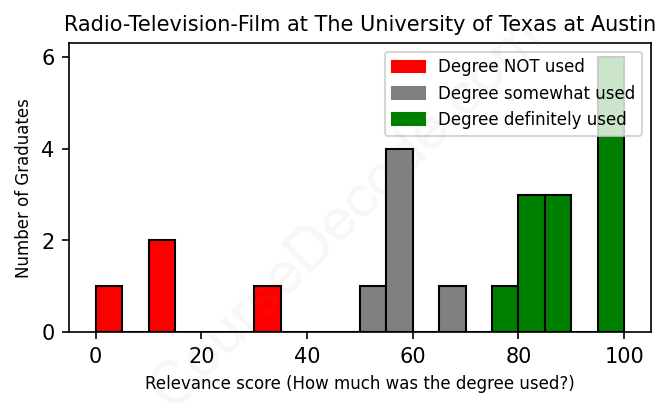
First, some facts. Of the Radio-Television-Film graduates from The University of Texas at Austin we've analyzed , here's how many have used (or NOT used) their degree in their career:

These are estimates based on AI analysis of 23 LinkedIn profiles (see below).
The verdict? Slightly above average. Overall, with an average relevance score of 72%, Radio-Television-Film graduates from The University of Texas at Austin have a slightly higher likelihood (+5%) of finding work in this field compared to the average graduate across all fields:
And for comparison, here's the chart for all profiles we've looked at across all degrees.
Also, after graduating, only 5% of these graduates have pursued further education other than another Bachelor's degree (such as a Masters degree or other), compared to the average across all profiles of 35%. This suggests a Bachelors degree is enough for most Radio-Television-Film graduates, and it's normal to look for work straight after graduation.
See the details:
|
Relevance score: 100% We think this person has gone into a career highly relevant to their degree. We think this person has gone into a career highly relevant to their degree.
DEGREE INFOGraduated in 2022 from The University of Texas at Austin with a Bachelor of Science - BS in Radio-Television-Film. No other secondary education since. JOB HISTORY SINCE GRADUATIONDigital Content Producer Sinclair Broadcast Group Jun 2022 - Dec 2023 Digital Journalist  Graham Media Group Jan 2024 - Present ABOUTGraduate of The University of Texas at Austin, majored in Radio-Televison-Film. Skilled in Sports Media, Television & Film Production, Social Media, Journalism, and Entertainment. Feel free to reach out or connect with me for more information! |
The top 10 most common jobs done by the graduates we've analyzed (ranked most common to least) are:
If you look at the variety of jobs held by graduates with a degree in Radio-Television-Film from The University of Texas at Austin, you'll notice a pretty mixed bag. Many of them have landed roles directly related to media production, like Film Producers, Video Editors, and Creative Leads, which makes sense considering their education. These positions typically utilize the skills they learned in school, such as video editing, production techniques, and media management. For example, jobs like being a Visual Effects Supervisor or a Digital Content Producer are spot on when it comes to utilizing their degree effectively, because they deal with fundamental aspects of film and media creation.
On the other hand, there are quite a few positions where the connection to Radio-Television-Film is a bit weaker. Some graduates have found themselves in roles that don't necessarily call for the specific skills from their degree, like Sales Agent, Customer Service Representative, or even Project Manager in unrelated fields. While soft skills like communication are always beneficial, these roles might not fully engage the expertise that a Radio-Television-Film program aims to develop. So, in short, while many graduates are making waves in relevant fields, a decent chunk of them is also scattered across roles that don't really showcase their training in media production. It’s kind of a mixed outcome, showing that a degree can take you in various directions, not all of which are directly linked to the film and television industries!
Here is a visual representation of the most common words in job titles for Radio-Television-Film graduates (this is across all Radio-Television-Film graduates we've analyzed, not just those who went to The University of Texas at Austin):

From the looks of it, graduates of the Radio-Television-Film program at The University of Texas at Austin have generally carved out some interesting paths in the media and entertainment industry, especially in their early careers. Right after graduation, many of these alumni often start off in entry-level roles such as production assistants, interns, or video editors, which makes sense given the competitive nature of the field. For example, we see graduates taking on diverse roles like production assistant at Freelance gigs or working as interns at well-known production companies. These initial jobs are crucial stepping stones, allowing them to build experience and connections in the industry.
Fast forward a few years, and it's pretty cool to see that many of these graduates have progressed into more specialized positions. Five or ten years down the line, graduates are landing roles such as project managers, video producers, and even executive producers. Some have become creative leads or started their own ventures, while others have taken on roles in major companies like Condé Nast or security firms, blending their film skills with corporate media needs. While there are a few who may have drifted into unrelated fields or faced challenges, a good number are thriving in careers that are highly relevant to Radio-Television-Film. So, if you’re interested in this field, it seems like there’s potential for a fulfilling career—you just need to keep hustling and seizing opportunities!
So, pursuing a Bachelor’s degree in Radio-Television-Film at UT Austin can definitely be a mix of fun and challenge, but it leans more toward the challenging side, especially if you want to really excel. The program is well-rounded and includes both practical hands-on work and theory, so you'll find yourself juggling projects, screenings, and a lot of group work. You’ll need to put in the time, especially with editing, production, and scriptwriting, which can get pretty intense, but it’s also really rewarding if you're passionate about the field. If you stay organized and committed, it can be manageable, but don’t underestimate the workload! Just be ready to dive in and embrace the chaos a bit—it's all part of the creative process!
Most commonly, in the LinkedIn profiles we've looked at, it takes people 4 years to finish a Bachelor degree in Radio-Television-Film.
So, looking at these Radio-Television-Film grads from UT Austin, it seems like they’ve had a pretty mixed bag in terms of making decent money. Graduates from the earlier classes, like 2010 and 2012, have a lot of freelance and assistant roles, which typically don’t pay as well, especially at the start. But as you dive into the more recent grads, like those from 2020, you see folks landing some solid positions like visual effects supervisors and project managers, which are generally better-paying gigs. However, there are still some who are juggling freelance and entry-level jobs, which might not be super lucrative. Overall, it looks like it varies a lot based on when they graduated and the kind of roles they’ve picked up along the way. So, while some are probably doing fine in the financial department, others might still be working their way up the ladder.
Here is a visual representation of the most common words seen in the "about" section of LinkedIn profiles who have a Bachelor degree in Radio-Television-Film (this is across all Radio-Television-Film graduates we've analyzed, not just those who went to The University of Texas at Austin). This may or may not be useful:

Here are all colleges offering a Bachelor degree in Radio-Television-Film (ordered by the average relevance score of their Radio-Television-Film graduates, best to worst) where we have analyzed at least 10 of their graduates:
| College | Score | Count |
|---|---|---|
 The University of Texas at Austin The University of Texas at Austin
|
72 | 23 |